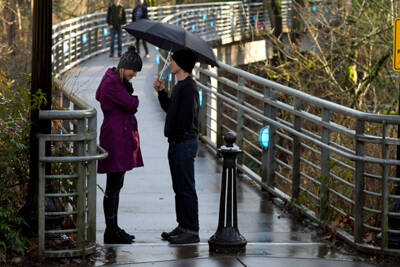There are many sub-genres of coming of age stories. We are drawn to them because we see ourselves in their paces. In the new film Blue Like Jazz (in theaters April 13) we have a spiritual coming of age story in a distinctively evangelical Protestant vein.
The opening sequence has the main character speaking directly to us, and Don Miller is intended to be a hero. This is no Woody Allen in the opening frames of "Annie Hall," but rather a confident young man telling us that what he didn’t know by the age of 19 was a lot, and perhaps it was because he grew up a Southern Baptist.
The story begins in the evangelical subculture. We see Don assisting his youth pastor, working with the kids in his church, and we watch him at his job, working for a company that manufactures plastic Communion cups pre-filled with red grape juice.
“Life is like jazz, it never resolves,” Don’s bum of a father tells him one morning as they sit outside his trailer home. Don has come from church and is soon headed back for another service, while his father has woken up with a young intern and listens to John Coltrane to watch the sun rise. Later that day, Don discovers that his mother (his parents are divorced) is as much a hypocrite as his father is a louse. She’s been sleeping with his youth pastor. At that moment he makes what is presented as a courageous decision: he leaves for Reed College in Oregon, foregoing a scholarship to Trinity College in another nearby Texas county.
By the end of his second day on campus at the notoriously liberal Reed, Don reveals to a student that he’s a Christian and receives some sage advice: “Do you have any idea what your hateful, bullying tribe has been up to? If you have any hope of making friends, get in the closet, Baptist boy, and stay there.” He follows that advice and becomes what he hates in his mother.
There is some genuine questing going on in this film, although the actors are mostly stereotypes. It would be paying them too much compliment to say that they are character actors. With one or two exceptions (Justin Welborn offers a nuanced performance as Don’s best friend), they are parodies. On campus, there is the gay man, the closed-minded intellectual, as well as someone in a rabbit suit who never speaks. And the screenplay—based on Don Miller’s New York Times bestselling memoir by the same name—almost parodies itself at times. Don sits at a table drinking milk when he arrives at Reed. He seems to constantly walk past bumper stickers or crèche scenes, all poking simple fun at his simple faith. (Again I thought of Woody Allen, who does it so much better in "Hannah and Her Sisters.") Don’s closest male friend dresses up like the pope, complete with mitre and pallium, and roams the dormitories looking for books to burn, while the first female student Don encounters at college is the woman standing to urinate beside him in the co-ed bathroom.
However, just past the midway point, we see Don and others begin to show not only character development, but the reason why we are here, watching. Don begins to move beyond simplicity and process his emotions and ideas of who God is. The girl he’s been pursuing, it turns out, is not only interested in social justice causes; she also goes to church.
“I read the Bible in Lit class last year and it turns out that I like Jesus—a lot,” she tells Don.
“Does anyone know?” he asks her.
“Are you going to turn me in?” she responds.
This young woman, then, becomes Don’s way back to the fold. But not before a series of angst-filled experiences and days. Don talks about God with friends. Don walks alone in the rain. Don is disappointed by more news from home—now his mother is pregnant. Then Don attends a debate on the topic “Does God Exist?” where he asks the rationalist on the panel, “Where, then, do we find meaning?” and is coldly told, “I suggest you consult a dictionary.”
All of this is followed by college partying and, equally as vapid, the juxtaposition of Don’s girl-interest becoming passionately involved in the lives of the needy in Kashmir. More stereotypes—and in this case quite unhelpful ones, as they only seem to reinforce the idea that upper-middle class white kids are easily bored and then just as easily convinced that momentary passion for a cause is a profound act.
“Sometimes you have to watch somebody love something, before you can love it yourself,” Don realizes toward the end of this coming of age tale, and while it’s an important and beautiful thought, it is also one that is never realized.
"Blue Like Jazz" is weakened by the all-too quick way that Donnie’s faith melts when he is challenged by modernism and diversity, and then the equal speed with which it is picked up again. But ultimately Blue Like Jazz fails because it does not show how spiritual practice works, or how it matters. It makes too much of belief, as if deciding thumbs up or thumbs down for the existence of God is what changes the world.
“You really believe in all of this stuff?” one of Don’s friends asks him by film’s end.
“I think…I do,” he stammers out.
So what?








